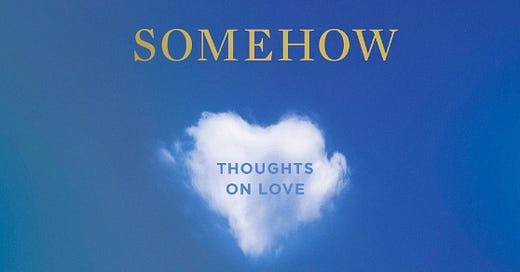BookLife Review by Carol O’Day: Somehow: Thoughts on Love (Anne Lamott, author)
Memoir, essays, critically acclaimed author, reflections on forms of love, community, addiction and sobriety, parenting, personal growth, community, serving others, faith
Days of division and change sometimes call for books that soothe and allow reflection and healing. Anne Lamott’s Somehow: Thoughts on Love may fill that bill. This book is Lamott’s 20th, preceded by well-loved and acclaimed works including Bird by Bird (on writing), Operating Instructions: A Journal of My Son’s First Year (on parenting), Traveling Mercies and many, many more.
Lamott’s current work is a reflection of the healing nature of love and the many forms love takes in a life well-lived. Several decades sober, Lamott’s work is infused with many tenets drawn from Alcoholics Anonymous, the Twelve-Step Program which she credits with changing her life, and from her faith. The richness of Somehow: Thoughts on Love is its expansiveness. The author grapples with not only the challenges of living a loving life (of gratitude, of service, of kindness to self and others, of generosity and of letting go), but the myriad ways in which love exists in the world. She posits that it is widely available to all, for the taking. Its price? Nothing, it is free. The cost? The ability to become still, listen and know thyself, well-enough at least.
Lamott’s tackles this vast topic in manageable, digestible bites. The book is not for speed readers. It requires patience, pauses and reflection. The nuggets it contains are dense and powerful; racing by them would be to waste the experience. Lamott buttresses each chapter theme with quotes by and theories of poets, theologians and writers. She illustrates the love-variant of each chapter with anecdotal stories from her own life–her Sunday school classes, attending a Yom Kippur service on a Northern California beach to confront her own mortality, her son’s addiction and her need to let go of attempting to fix him, the value of community, and the power of walking in nature to restore. Lamott opens the book with a famous poem by Rumi, an invitation for the reader to embrace all the experiences of living, including the dark sides-depression, meanness, sorrow, malice, shame–as opportunities for healing and growth. She quotes,
The Guest House
This being human is a guest house.
Every morning a new arrival.
A joy, a depression, a meanness,
some momentary awareness comes
as an unexpected visitor.
Welcome and entertain them all!
Even if they are a crowd of sorrows,
who violently sweep your house
empty of its furniture,
still, treat each guest honorably.
He may be clearing you out
for some new delight.
The dark thought, the shame, the malice,
meet them at the door laughing,
and invite them in.
Be grateful for whoever comes,
because each has been sent
as a guide from beyond
–Rumi
The success of Lamott’s books in general and Somehow: Thoughts on Love in particular is her willingness to be vulnerable. Lamott lays out her failures and foibles for all to see and candidly describes how she recovered from each major misstep. As an AA sponsor, she once offended a fellow traveler in the program by going negative and critical on a friend of his, causing him to sever their relationship. She recognized her harsh comments as an error and was desperate to grovel and apologize. Her own friend encouraged her to pause and suggested, over several days, “maybe not today.” Instead, she took walks, baked, spent time with her dogs, and meditated. Her mantra for recovering from pain or failure, “...the launch code when under attack: gratitude, chores, chocolate [kindness to self], service, breath, nature.” Again and again, Lamott returns to this series of actions as a way to move through troubling times.
Among the more powerful chapters in the book is the one titled Cowboy. She quotes a fundamental recovery community tenet: "The opposite of addiction is not sobriety, it’s connection.” It is in isolation that pain, self-doubt, self-criticism and fear grow. In community we connect and we find ways to be of service. These opportunities, she writes, allow us to give and receive love. In community you are given “the sacrament of welcome” and the opportunity to extend it to others, the ultimate grace. The exercise of joining, of stepping outside of isolation, of being in community allows you to overcome the buried idea that “you think that, sadly, you don’t have time for this because you’re a busy and important person.” Instead, she writes, “It is the reality of being human, of needing help and being helpers. This is how we are, this is our true selves…. Love is call-and-response.” Lamott’s chapter on community is but one of many crystallized gems. In other chapters she parses her inclination to try to “fix” others and the value of letting go of that habit. She ponders the value of saved and stored detritus from our lives–those bug-infested boxes in the attic filled with reminders of moments of joy or milestones in our pasts and the value of releasing them to live in the present. She discovers in a dream the power of forgiveness, that letting go of resentment toward her stepmother allowed her to see how well her stepmother loved not only her father but also her and her siblings.
In an era (and perhaps an immediate period of future years) we may need resources for living lovingly, being kind to ourselves and others, and tools for discerning and celebrating love, in its many forms and habitats-nature, girlfriends, spouses, children, grandchildren, church communities, pickleball partners, and pets. Somehow: Thoughts on Love is a compact, though dense, book to have on your shelf for the days, months and years ahead.
Support BookLife: Reviews for Readers and independent bookstores by purchasing Somehow: Thoughts on Love using the link below:





